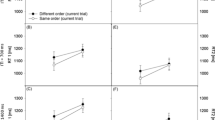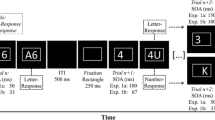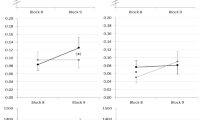Abstract
Task switching involves switch cost (poorer performance switch trials than in task-repetition trials) and mixing cost (poorer performance in task-repetition trials than in trials from blocks without task switching). These are mainly studied with the alternating runs task-switching (ARTS) paradigm (in which the task changes every constant number of trials) or the cued task-switching (CTS) paradigm, in which the tasks change randomly. The authors tested the hypothesis that dealing with actual or potential conflicts regarding which task is currently required contribute to mixing cost in CTS more than in ARTS and contribute to switch costs more in ARTS than in CTS. This hypothesis was tested using ex-Gaussian modeling of reaction time (RT) distributions, in which the heaviness of the right tail marks task conflicts (Steinhauser and Hübner in J Exp Psychol Human Percept Perform 35:1398–1412 2009). As predicted, a heavier RT-distribution tail marked switch cost more strongly in ARTS than in CTS and marked mixing costs more strongly in CTS than in ARTS. These results indicate that switch cost and mixing cost reflect different processes in different task-switching paradigms.


Similar content being viewed by others
References
Altmann, E. M. (2007). Comparing switch costs: alternating runs and explicit cuing. Journal of Experimental Psychology. Learning, Memory, and Cognition, 33, 475–483.
Altmann, E. M. (2013). Fine-grain episodic memory processes in cognitive control. Zeitschrift für Psychologie, 221, 23–32.
Altmann, E. M., & Gray, W. D. (2008). An integrated model of cognitive control in task switching. Psychological Review, 115, 602–639.
Andreadis, N., & Quinlan, P. T. (2010). Task switching under predictable and unpredictable circumstances. Attention, Perception, & Psychophysics, 72, 1776–1790.
Braver, T. S., Reynolds, J. R., & Donaldson, D. I. (2003). Neural mechanisms of transient and sustained cognitive control during task switching. Neuron, 39, 713–726.
Braverman, A., & Meiran, N. (2010). Task conflict effect in task switching. Psychological Research, 74, 568–578.
Fagot, C. (1994). Chronometric investigation of task switching. Unpublished doctoral dissertation, University of California, San Diego.
Gilbert, S. J., & Shallice, T. (2002). Task switching: a PDP model. Cognitive Psychology, 44, 297–337.
Goldfarb, L., & Henik, A. (2007). Evidence for task conflict in the Stroop effect. Journal of Experimental Psychology: Human Perception and Performance, 33, 1170–1176.
Hollands, J. G., & Jarmasz, J. (2010). Revisiting confidence intervals for repeated measures designs. Psychonomic Bulletin & Review, 17, 135–138.
Jarmasz, J., & Hollands, J. G. (2009). Confidence intervals in repeated-measures designs: the number of observations principle. Canadian Journal of Experimental Psychology, 63, 124–138.
Jersild, A. T. (1927). Mental set and shift. Archives of Psychology, 14(89), 81.
Kessler, Y., & Meiran, N. (2010). The reaction-time task-rule congruency effect is not affected by working memory load: further support for the activated long-term memory hypothesis. Psychological Research, 74, 388–399.
Kiesel, A., Steinhauser, M., Wendt, M., Falkenstein, M., Jost, K., Philipp, A. M., et al. (2010). Control and interference in task switching: a review. Psychological Bulletin, 136, 849–874.
Kiesel, A., Wendt, M., & Peters, A. (2007). Task switching: on the origin of response congruency effects. Psychological Research, 71, 117–125.
Koch, I. (2003). The role of external cues for endogenous advance reconfiguration in task switching. Psychonomic Bulletin & Review, 10, 488–492.
Koch, I. (2005). Sequential task predictability in task switching. Psychonomic Bulletin & Review, 12, 107–112.
Koch, I., Prinz, W., & Allport, A. (2005). Involuntary retrieval in alphabet–arithmetic tasks: task-mixing and task-switching costs. Psychological Research, 69, 252–261.
Kray, J., & Lindenberger, U. (2000). Adult age differences in task switching. Psychology and Aging, 15, 126–147.
Lacouture, Y., & Cousineau, D. (2008). How to use MATLAB to fit the ex-Gaussian and other probability functions to a distribution of response times. Tutorials in Quantitative Methods for Psychology, 4, 35–45.
Meiran, N. (1996). Reconfiguration of processing mode prior to task performance. Journal of Experimental Psychology. Learning, Memory, and Cognition, 22, 1423–1442.
Meiran, N. (2010). Task switching: Mechanisms underlying rigid vs. flexible self control. In R. Hassin, K. Ochsner, & Y. Trope (Eds.), Self control in society, mind and brain (pp. 202–220). NY: Oxford University Press.
Meiran, N., Chorev, Z., & Sapir, A. (2000). Component processes in task switching. Cognitive Psychology, 41, 211–253.
Meiran, N., & Daichman, A. (2005). Advance task preparation reduces task error rate in the cueing task-switching paradigm. Memory and Cognition, 33, 1272–1288.
Meiran, N., Gotler, A., & Perlman, A. (2001). Old age is associated with a pattern of relatively intact and relatively impaired task-set switching abilities. Journals of Gerontology: Series B: Psychological Sciences & Social Sciences B, 56, 88–102.
Meiran, N., & Kessler, Y. (2008). The task rule congruency effect in task switching reflects activated long term memory. Journal of Experimental Psychology: Human Perception and Performance, 34, 137–157.
Meiran, N., Kessler, Y., & Adi-Japha, E. (2008). Control by Action Representation and Input Selection (CARIS): a theoretical framework for task switching. Psychological Research, 72, 473–500.
Monsell, S. (2003). Task Switching. Trends in Cognitive Sciences, 7, 134–140.
Monsell, S., Sumner, P., & Waters, H. (2003). Task-set reconfiguration with predictable and unpredictable task switches. Memory & Cognition, 31, 327–342.
Pereg, M., Shahar, N., & Meiran, N. (2013). Task-switching training effects are mediated by working-memory management. Intelligence, 41, 467–478.
Ratcliff, R. (1993). Methods for dealing with reaction time outliers. Psychological Bulletin, 114, 510–532.
Rogers, R. D., & Monsell, S. (1995). The cost of a predictable switch between simple cognitive tasks. Journal of Experimental Psychology: General, 124, 207–231.
Rubin, O., & Meiran, N. (2005). On the origins of the task mixing cost in the cuing task-switching paradigm. Journal of Experimental Psychology. Learning, Memory, and Cognition, 31, 1477–1491.
Schmiedek, F., Oberauer, K., Wilhelm, O., Suss, H. M., & Wittmann, W. W. (2007). Individual differences in components of reaction time distributions and their relations to working memory and intelligence. Journal of Experimental Psychology: General, 13, 414–429.
Schmitz, F., & Voss, A. (2012). Decomposing task-switching costs with the diffusion model. Journal of Experimental Psychology: Human Perception and Performance, 38, 222–250.
Shaffer, L. H. (1965). Choice reaction with variable S-R mapping. Journal of Experimental Psychology, 70, 284–288.
Steinhauser, M., & Hübner, R. (2009). Distinguishing response conflict and task conflict in the Stroop task: evidence from ex-Gaussian distribution analysis. Journal of Experimental Psychology: Human Perception and Performance, 35, 1398–1412.
Tornay, F. J., & Milán, E. G. (2001). A more complete task-set reconfiguration in random than in predictable task switch. The Quarterly Journal of Experimental Psychology, 54A, 785–803.
van ‘t Wout, F., Lavric, A., & Monsell, S. (2013). Are stimulus-response rules represented phonologically for task-set preparation and maintenance? Journal of Experimental Psychology. Learning, Memory, and Cognition, 39, 1538–1551.
Vandierendonck, A., Liefooghe, B., & Verbruggen, F. (2010). Task switching: interplay of reconfiguration and interference. Psychological Bulletin, 136, 601–626.
Waszak, F., Hommel, B., & Allport, A. (2003). Task-switching and long term priming: role of episodic stimulus-task bindings in task-shift costs. Cognitive Psychology, 46, 361–413.
Woodward, T. S., Meier, B., Tipper, C., & Graf, P. (2003). Bivalency is costly: bivalent stimuli elicit cautious responding. Experimental Psychology, 50, 233–238.
Acknowledgments
We wish to thank Maayan Pereg for her help in designing the experiment, Miriam Gade and an anonymous reviewer for helpful comments. This research was supported by a research grant from the Israel Science Foundation to N. Meiran.
Author information
Authors and Affiliations
Corresponding author
Rights and permissions
About this article
Cite this article
Shahar, N., Meiran, N. Differential contribution of task conflicts to task switch cost and task mixing cost in alternating runs and cued task-switching: evidence from ex-Gaussian modeling of reaction time distributions. Psychological Research 79, 259–266 (2015). https://doi.org/10.1007/s00426-014-0569-1
Received:
Accepted:
Published:
Issue Date:
DOI: https://doi.org/10.1007/s00426-014-0569-1




